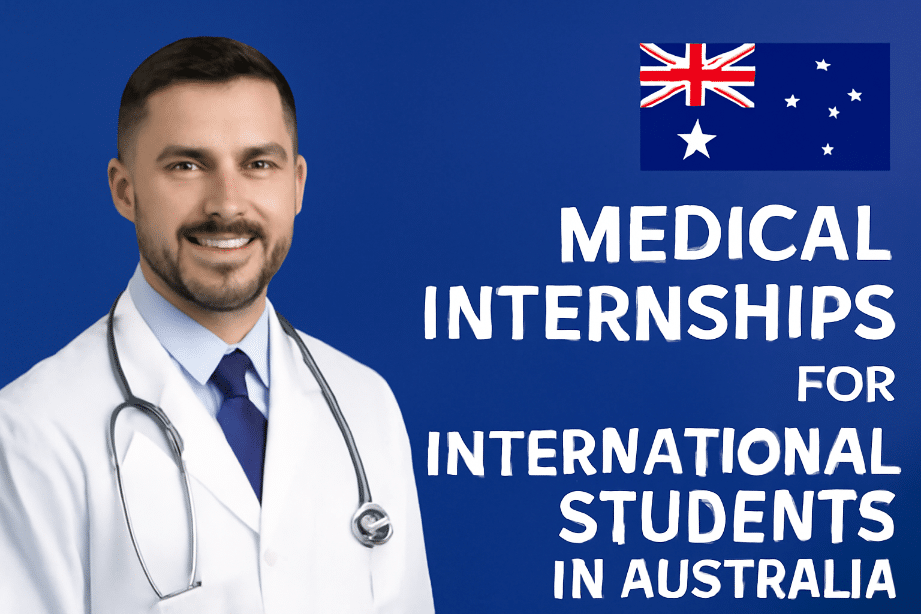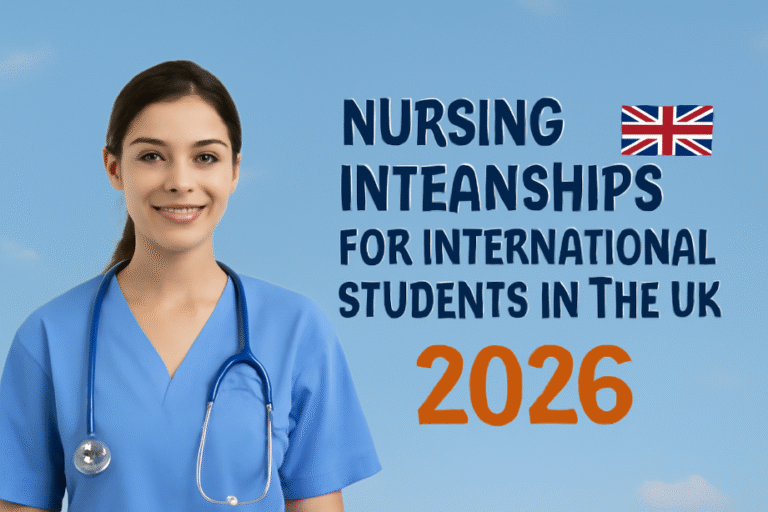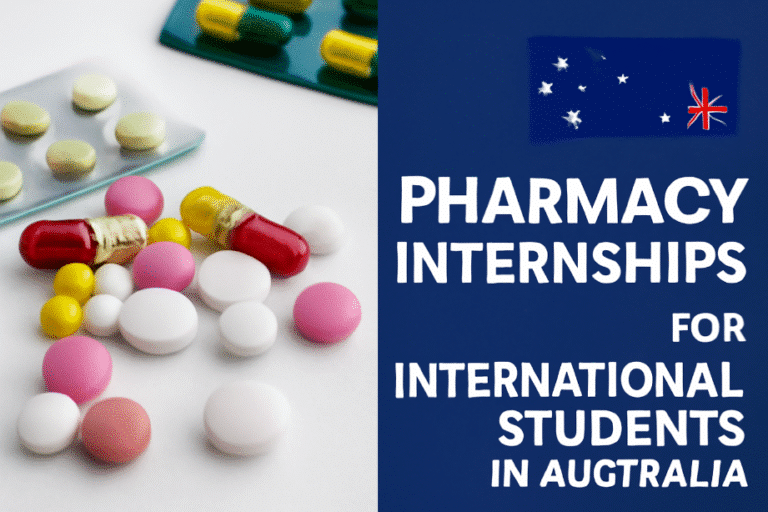15 Best Medical Internships for International Students in Australia 2026: Your Path to Medical Excellence
Medical Internships for International Students in Australia 2026: Your Path to Medical Excellence
Transform Your Career in Australia’s World-Class Healthcare System
Australia’s healthcare system ranks among the world’s most advanced and equitable, providing international students with exceptional opportunities to gain clinical experience across cutting-edge medical facilities, research institutions, and community health services. With over 750 public hospitals, 630 private hospitals, and comprehensive primary healthcare networks, Australia’s medical landscape offers diverse pathways for international students pursuing clinical medicine, nursing, allied health, and medical research careers.
This comprehensive guide explores premium medical internship opportunities specifically designed for international students seeking to build successful careers in Australia’s dynamic healthcare sector. Whether you’re pursuing clinical practice, medical research, public health, or specialized healthcare administration, Australia’s leading medical institutions offer structured programs combining clinical excellence with hands-on patient care experience in multicultural healthcare environments.
International students bring valuable global perspectives to Australian medical practice, contributing to innovative treatment approaches, cultural competency in patient care, and research collaboration in addressing complex health challenges. With proper visa arrangements and clinical registration pathways, your medical internship becomes a foundation for permanent residency and leadership roles in Australia’s expanding healthcare economy.
Important Note: Medical internships for international students require specific visa arrangements, AHPRA registration pathways, and compliance with clinical supervision requirements. Australian and New Zealand medical graduates must complete accredited intern training (postgraduate year one (PGY1) training) to become eligible for general registration, with international medical graduates following modified pathways through the Australian Medical Council.
15 Premier Medical Internship Opportunities for International Students
1. NSW Health Medical Intern Program
General Brief Overview
NSW Health manages the recruitment of medical interns across 15 prevocational training networks, offering valuable clinical experience across a range of settings. International students gain comprehensive exposure to Australia’s largest public healthcare system, including tertiary hospitals, community health centers, and specialized medical services across metropolitan and regional locations throughout New South Wales.
Qualifications or Requirements
- Medical degree from recognized Australian or international medical school
- Successful completion of Australian Medical Council (AMC) examinations for international graduates
- Provisional registration with Australian Health Practitioner Regulation Agency (AHPRA)
- Valid Australian work visa with healthcare sector authorization
- English language proficiency meeting Australian medical practice standards
- Current police clearance and working with children check
- Immunization requirements and health screening compliance
Application Timeline
Medical intern applications typically open in April with selection processes completed by September for following year commencement. International applicants require additional processing time for AMC pathway completion and visa arrangements.
Paid or Unpaid Status
Paid Medical Position – Medical interns receive competitive salaries with the average across Australia being $68,992 per year, with NSW offering comprehensive benefits including professional development allowances and medical indemnity coverage.
Location: In Person or Remote or Hybrid
Clinical Hospital Settings – Placements across NSW public hospitals including Prince of Wales, Royal Prince Alfred, Westmead, and John Hunter hospitals with rotations through emergency medicine, surgery, internal medicine, and specialty departments.
Where and How To Apply
Applications through NSW Health Education and Training Institute (HETI). Complete comprehensive application including medical qualifications, clinical references, and career development plans.
2. Queensland Health Medical Internship Program
General Brief Overview
Queensland Health offers medical internships across hospital and health services, providing international students with exposure to tropical medicine, rural healthcare delivery, and advanced tertiary medical services. The program includes both general medical internships and specialized Queensland Rural Generalist pathways for students interested in comprehensive rural medical practice.
Qualifications or Requirements
- Medical qualification recognized by Australian Medical Council
- Provisional medical registration through AHPRA processes
- Successful completion of AMC clinical examinations for international graduates
- Valid Australian work authorization with healthcare sector eligibility
- Demonstrated clinical competency and professional communication skills
- Commitment to Queensland Health values and patient-centered care
- Physical and mental health clearances for clinical practice
Application Timeline
The intern campaign for 2026 clinical year applications close according to Queensland Health recruitment schedules, typically in May-June with early applications encouraged for international candidates requiring additional processing time.
Paid or Unpaid Status
Paid Clinical Internship – Queensland Health intern salaries competitive with national standards, ranging from AUD $70,000-$85,000 annually with comprehensive clinical supervision, professional development, and locum relief benefits.
Location: In Person or Remote or Hybrid
Hospital Networks – Placements across Queensland hospital and health services including Royal Brisbane and Women’s, Princess Alexandra, Gold Coast University Hospital, and regional centers with tropical medicine exposure.
Where and How To Apply
Submit applications via Queensland Health careers portal. Include medical education transcripts, clinical experience documentation, and rural healthcare interest statements where applicable.
3. Western Australia Medical Intern Recruitment
General Brief Overview
Western Australia’s medical intern recruitment process includes applications meeting eligibility criteria in suitable recruitment pools, with selection decisions made by primary employing hospitals. International students gain exposure to WA’s unique healthcare challenges including mining industry medicine, remote area healthcare, and indigenous health initiatives.
Qualifications or Requirements
- Medical degree completion with satisfactory academic performance
- Australian Medical Council pathway completion for international graduates
- AHPRA provisional registration with supervised practice authorization
- Valid Western Australian work visa and clinical practice rights
- Cultural competency for indigenous healthcare and remote area medicine
- Physical fitness for potential remote location assignments
- Commitment to WA Health clinical governance and safety standards
Application Timeline
WA medical intern applications typically close in May-June with comprehensive selection processes including clinical assessments and competency evaluations completed by August for following year placement.
Paid or Unpaid Status
Paid Medical Internship – Western Australia offers some of the highest medical intern wages in the country, with salaries ranging from AUD $75,000-$90,000 annually plus remote area allowances and professional development support.
Location: In Person or Remote or Hybrid
WA Health Network – Placements across Perth metropolitan hospitals including Royal Perth, Sir Charles Gairdner, and Fiona Stanley hospitals, with potential regional assignments to Pilbara and Kimberley remote healthcare facilities.
Where and How To Apply
Applications through Postgraduate Medical Council of Western Australia. Submit detailed medical qualifications, clinical competency evidence, and remote healthcare interest documentation.
4. South Australian Medical Intern Program
General Brief Overview
South Australia offers an estimated 353 medical intern positions including 47 rural intern posts, with annual salaries of $81,814 and professional development allowances of $4,500 per annum. International students experience SA’s integrated healthcare delivery model combining metropolitan tertiary services with innovative rural health outreach programs.
Qualifications or Requirements
- Graduation from medical school within the last two years (to start internship in 2026, completion in 2025 or 2024 cohort)
- Australian Medical Council assessment completion for international medical graduates
- AHPRA provisional registration with clinical supervision arrangements
- Valid South Australian work authorization with healthcare practice rights
- Demonstrated clinical skills and professional competency standards
- Interest in integrated healthcare delivery and rural medicine opportunities
- Commitment to continuous professional development and evidence-based practice
Application Timeline
South Australian medical intern applications open in April with selection processes including clinical interviews and competency assessments completed by July for following year commencement.
Paid or Unpaid Status
Paid Medical Position – Competitive intern salaries of AUD $81,814 annually with substantial professional development allowances, rural placement incentives, and comprehensive clinical supervision support.
Location: In Person or Remote or Hybrid
SA Health Networks – Placements across Adelaide metropolitan hospitals including Royal Adelaide, Flinders Medical Centre, and Women’s and Children’s Hospital, with rural assignments to regional healthcare centers throughout South Australia.
Where and How To Apply
Submit applications through SA Health medical recruitment processes. Include comprehensive medical education documentation, clinical experience portfolios, and rural healthcare service commitment statements.
5. Victoria Medical Intern Match Program
General Brief Overview
Victoria’s intern match system includes priority arrangements for different candidate groups, with international students as temporary residents classified in specific matching categories. The program provides exposure to Victoria’s comprehensive healthcare network including world-renowned medical research institutions and specialized clinical services.
Qualifications or Requirements
- Medical degree from accredited Australian or international institution
- Australian Medical Council pathway completion with clinical competency demonstration
- AHPRA provisional registration with supervised medical practice authorization
- Valid Victorian work visa with healthcare sector employment rights
- Professional communication skills and cultural competency for diverse patient populations
- Commitment to Victorian healthcare values and clinical governance standards
- Medical indemnity insurance and professional development planning
Application Timeline
Victorian medical intern applications follow structured matching processes with applications due in May and matching results announced in August for following year clinical commencement.
Paid or Unpaid Status
Paid Clinical Internship – Victorian medical intern salaries competitive with national standards, approximately AUD $72,000-$82,000 annually with performance incentives, professional development support, and clinical supervision benefits.
Location: In Person or Remote or Hybrid
Victorian Health Networks – Placements across Melbourne’s major hospitals including Melbourne Health, Monash Health, and Alfred Health networks, with regional assignments to rural Victorian healthcare services.
Where and How To Apply
Applications through Postgraduate Medical Council of Victoria matching system. Complete comprehensive medical qualification verification, clinical competency assessment, and career preference documentation.
6. Tasmania Medical Intern Program
General Brief Overview
Tasmania’s medical intern program requires unique intern placement numbers generated by AHPRA and distributed to final year medical students. International students gain experience in Tasmania’s integrated healthcare delivery model serving both urban and remote island communities with emphasis on telemedicine and rural healthcare innovation.
Qualifications or Requirements
- Final year medical student status or recent medical graduate from recognized institution
- AHPRA intern placement number and provisional registration eligibility
- Australian Medical Council assessment completion for international candidates
- Valid Tasmanian work authorization with clinical practice rights
- Interest in remote healthcare delivery and telemedicine applications
- Physical and mental health clearances for clinical practice in isolated environments
- Commitment to professional development and continuous learning
Application Timeline
Tasmanian medical intern applications typically open in March with selection processes completed by June, requiring early submission for international candidates with additional verification requirements.
Paid or Unpaid Status
Paid Medical Internship – Tasmanian intern salaries aligned with national standards, approximately AUD $70,000-$80,000 annually with remote area allowances, professional development support, and unique island healthcare experience.
Location: In Person or Remote or Hybrid
Tasmanian Health Network – Placements primarily at Royal Hobart Hospital and Launceston General Hospital with rotations to rural healthcare centers and telemedicine consultation services throughout Tasmania.
Where and How To Apply
Applications through Tasmanian Department of Health medical careers portal. Submit medical qualifications, intern placement numbers, and rural healthcare interest statements.
7. Northern Territory Medical Intern Positions
General Brief Overview
Northern Territory offers 96 medical intern positions with annual salaries of $77,898, professional development allowances of $1,040 per annum plus $900 mobile allowance and $4,000 additional support. International students gain unique exposure to tropical medicine, indigenous healthcare, and remote area clinical practice in one of Australia’s most challenging healthcare environments.
Qualifications or Requirements
- Medical qualification recognized by Australian Medical Council
- AHPRA provisional registration with Northern Territory practice authorization
- Tropical medicine knowledge and cultural competency for indigenous healthcare
- Physical fitness and mental resilience for remote area clinical practice
- Valid Northern Territory work visa with healthcare sector employment rights
- Emergency medical procedures training and rural healthcare competencies
- Commitment to NT Health clinical governance and professional standards
Application Timeline
NT medical intern applications open annually in April with intensive selection processes including tropical medicine assessments and remote area readiness evaluations completed by July.
Paid or Unpaid Status
Paid Remote Medical Practice – Competitive intern salaries of AUD $77,898 annually with substantial remote area allowances, mobile phone support, professional development funding, and unique tropical medicine experience.
Location: In Person or Remote or Hybrid
NT Health Services – Placements primarily at Royal Darwin Hospital with rotations to Alice Springs Hospital, Katherine District Hospital, and remote community health centers throughout Northern Territory’s vast geography.
Where and How To Apply
Applications through Northern Territory Health medical recruitment processes. Include tropical medicine interests, indigenous healthcare cultural competency, and remote area service commitment statements.
8. Private Hospital Stream Medical Internships
General Brief Overview
The Private Hospital Stream supports education, training and supervision for junior doctors in private hospitals, including expanded settings and rural communities. International students gain exposure to Australia’s private healthcare sector with emphasis on specialized medical services, elective procedures, and premium patient care delivery models.
Qualifications or Requirements
- Medical degree completion with strong academic performance
- Australian Medical Council assessment and AHPRA provisional registration
- Private healthcare sector experience or demonstrated interest
- Professional communication skills for premium patient care environments
- Valid Australian work authorization with private healthcare employment rights
- Medical indemnity insurance and professional liability coverage
- Commitment to private healthcare quality standards and patient satisfaction
Application Timeline
Private Hospital Stream Expression of Interest process opens in September and closes in October, with competitive selection processes including clinical assessments and private healthcare orientation programs.
Paid or Unpaid Status
Paid Private Healthcare Position – Private hospital intern salaries often exceed public sector rates, ranging from AUD $75,000-$95,000 annually with performance bonuses, premium healthcare benefits, and specialized clinical training.
Location: In Person or Remote or Hybrid
Private Healthcare Facilities – Placements across accredited private hospitals nationwide with emphasis on specialized services, elective surgery, and premium patient care delivery in metropolitan and regional locations.
Where and How To Apply
Submit applications through Australian Government Department of Health Private Hospital Stream portal. Include private healthcare interests, clinical excellence examples, and patient care philosophy statements.
9. Australian National University Medical Research Internship
General Brief Overview
ANU’s medical research internship program offers international students 12-week intensive research placements with leading medical researchers in genomics, immunology, neuroscience, and translational medicine. Students contribute to nationally significant medical research while gaining experience in clinical research methodology and evidence-based medicine development.
Qualifications or Requirements
- Medical or biomedical science students with strong research interest and academic performance
- Research methodology background and statistical analysis capabilities
- Laboratory safety training and clinical research ethics knowledge
- Professional communication skills for research collaboration and publication
- Valid Australian student visa with research work authorization
- Commitment to medical research ethics and intellectual property protocols
- Interest in translational medicine and evidence-based clinical practice
Application Timeline
Medical research internship applications due in February and August for semester and summer research periods, with competitive selection including research proposal development and faculty interviews.
Paid or Unpaid Status
Paid Research Position – Research stipends from AUD $700-$1,000 weekly with conference presentation support, research publication opportunities, and medical research career development pathways.
Location: In Person or Remote or Hybrid
Research Laboratories – ANU’s Canberra medical research facilities with collaborations across National Health and Medical Research Council institutes and clinical research networks nationwide.
Where and How To Apply
Applications via Australian National University medical research portal. Include research interests, academic transcripts, and clinical research experience documentation.
10. University of Sydney Medical Student Placements
General Brief Overview
University of Sydney Faculty of Medicine and Health offers placements and internships providing opportunities to contribute to healthcare organizations and connect with professionals, including specialized programs in dental medicine, nursing, and allied health disciplines with comprehensive clinical supervision and professional development.
Qualifications or Requirements
- Current enrollment in University of Sydney medical or health science programs
- Completion of foundational medical subjects with satisfactory academic progress
- Clinical competency demonstration and professional communication abilities
- Valid student visa with academic placement authorization
- Professional indemnity coverage through university clinical placement insurance
- Cultural competency for diverse healthcare environments and patient populations
- Commitment to professional development and reflective clinical practice
Application Timeline
University clinical placements coordinate with academic calendars, with applications opening in February and July for semester and summer clinical rotation assignments.
Paid or Unpaid Status
Academic Clinical Placement – Primarily unpaid academic placements with comprehensive clinical supervision, academic credit, and professional development opportunities leading to clinical competency certification.
Location: In Person or Remote or Hybrid
Sydney Healthcare Network – Placements across Sydney’s major teaching hospitals including Royal Prince Alfred, Chris O’Brien Lifehouse, and Westmead Hospital with comprehensive clinical rotation programs.
Where and How To Apply
Applications through University of Sydney Faculty of Medicine and Health placement portal. Submit academic transcripts, clinical competency assessments, and professional development plans.

11. Royal Australian College of Physicians Trainee Program
General Brief Overview
The Royal Australian College of Physicians (RACP) trainee program provides international medical graduates with structured pathways to specialist physician training through Basic Physician Training and Advanced Physician Training programs. Trainees gain comprehensive exposure to internal medicine subspecialties while working toward specialist registration.
Qualifications or Requirements
- Medical degree completion and successful AHPRA general registration
- Completion of prevocational training requirements including internship and residency
- RACP Basic Physician Training entry requirements and selection processes
- Strong clinical competency in internal medicine and patient care
- Valid Australian work authorization with specialist training eligibility
- Professional communication skills and commitment to lifelong learning
- Research capability and evidence-based medicine understanding
Application Timeline
RACP training applications open annually in March with comprehensive selection processes including clinical assessments, academic evaluations, and competency interviews completed by July.
Paid or Unpaid Status
Paid Specialist Training – RACP trainees receive competitive medical specialist salaries ranging from AUD $85,000-$120,000 annually with progressive increases, conference support, and specialist development opportunities.
Location: In Person or Remote or Hybrid
Teaching Hospitals – Training placements across Australia’s major teaching hospitals with rotations through internal medicine subspecialties, emergency medicine, and specialized clinical services nationwide.
Where and How To Apply
Applications through Royal Australian College of Physicians training portal. Include medical qualifications, clinical experience documentation, and specialist training career objectives.
12. Royal Australian and New Zealand College of Psychiatrists Training
General Brief Overview
RANZCP’s psychiatry training program offers international medical graduates comprehensive pathways to specialist psychiatric practice through structured clinical rotations, research projects, and professional development in mental health services across diverse Australian healthcare settings including community mental health, forensic psychiatry, and specialized treatment centers.
Qualifications or Requirements
- Medical qualification and AHPRA general registration with psychiatric interest
- Completion of general medical training including internship and residency requirements
- RANZCP selection criteria including psychological assessment and clinical competency
- Cultural competency for mental healthcare delivery in diverse populations
- Valid Australian work authorization with psychiatric practice eligibility
- Professional communication skills for therapeutic relationships and crisis intervention
- Research methodology understanding for evidence-based psychiatric practice
Application Timeline
RANZCP training applications open annually in February with comprehensive selection including psychological assessments, clinical interviews, and competency evaluations completed by May.
Paid or Unpaid Status
Paid Psychiatric Training – Psychiatry trainees receive competitive medical specialist salaries from AUD $90,000-$130,000 annually with mental health service allowances, professional development support, and specialist psychiatric credentials.
Location: In Person or Remote or Hybrid
Mental Health Services – Training across public and private psychiatric facilities, community mental health centers, forensic mental health units, and specialized psychiatric treatment centers throughout Australia.
Where and How To Apply
Submit applications via Royal Australian and New Zealand College of Psychiatrists training portal. Include psychiatric interest statements, clinical experience in mental health, and professional development commitments.
13. Australian College of Emergency Medicine Training Program
General Brief Overview
ACEM’s emergency medicine training provides international medical graduates with comprehensive preparation for specialist emergency medicine practice through intensive clinical rotations, trauma management, critical care medicine, and disaster response training across Australia’s emergency healthcare network including major trauma centers and regional emergency departments.
Qualifications or Requirements
- Medical degree and AHPRA general registration with emergency medicine interest
- Successful completion of prevocational medical training requirements
- ACEM selection criteria including clinical competency and emergency medicine aptitude
- Physical and mental fitness for high-stress emergency medical environments
- Valid Australian work authorization with emergency medicine practice rights
- Advanced life support certifications and trauma management training
- Professional resilience and teamwork capabilities for critical care delivery
Application Timeline
ACEM training applications open annually in January with rigorous selection processes including clinical simulations, emergency medicine assessments, and competency interviews completed by April.
Paid or Unpaid Status
Paid Emergency Medicine Training – Emergency medicine trainees receive premium specialist salaries from AUD $95,000-$140,000 annually with critical care allowances, professional development funding, and emergency medicine specialization.
Location: In Person or Remote or Hybrid
Emergency Departments – Training across major trauma centers, metropolitan emergency departments, rural emergency services, and specialized critical care units with exposure to diverse emergency medical conditions.
Where and How To Apply
Applications through Australasian College for Emergency Medicine training portal. Include emergency medicine experience, critical care competencies, and trauma management capabilities documentation.
14. University of South Australia Clinical Placement Program
General Brief Overview
University of South Australia’s Clinical Placement Unit provides administrative support for health disciplines including nursing, midwifery, allied health, pharmacy, medical and laboratory sciences, offering comprehensive placement opportunities through private industry partnerships and public healthcare network collaborations.
Qualifications or Requirements
- Current enrollment in UniSA health sciences or medical programs
- Completion of foundational health science subjects with academic competency
- Clinical readiness assessment and professional behavior standards
- Valid student visa with clinical placement authorization
- Professional indemnity insurance through university placement coverage
- Cultural competency for diverse healthcare environments and patient interactions
- Commitment to professional development and evidence-based healthcare practice
Application Timeline
Clinical placement applications coordinate with academic semester schedules, opening in February and July with placement matching processes completed within 4-6 weeks for clinical rotation assignments.
Paid or Unpaid Status
Academic Clinical Experience – Unpaid academic placements with comprehensive clinical supervision, academic credit, and professional development opportunities preparing students for healthcare practice registration.
Location: In Person or Remote or Hybrid
SA Healthcare Network – Placements across South Australian public hospitals, private healthcare facilities, community health centers, and specialized healthcare services throughout Adelaide metropolitan and regional areas.
Where and How To Apply
Applications through University of South Australia Clinical Placement Unit portal. Submit academic transcripts, clinical readiness assessments, and professional development objectives.
15. Australian Medical Students’ Association (AMSA) International Exchange
General Brief Overview
AMSA’s international exchange program facilitates medical student exchanges between Australian medical schools and international institutions, providing reciprocal clinical experience opportunities, cultural competency development, and global healthcare perspectives through structured partnerships with medical education institutions worldwide.
Qualifications or Requirements
- Current enrollment in Australian medical degree programs with good academic standing
- Completion of at least two years of medical studies with clinical competency
- Professional communication skills and cultural adaptability for international healthcare
- Valid passport and international healthcare placement visa requirements
- Medical indemnity insurance and international healthcare practice coverage
- Language proficiency appropriate for international placement destinations
- Commitment to cultural exchange and global healthcare understanding
Application Timeline
International exchange applications open annually in March with placement matching and preparation processes extending through August for following year exchange assignments and cultural preparation programs.
Paid or Unpaid Status
Academic Exchange Program – Unpaid cultural and educational exchange with scholarship opportunities, travel support, and comprehensive preparation programs for global healthcare experience.
Location: In Person or Remote or Hybrid
International Healthcare Settings – Exchange placements across partner medical institutions worldwide with emphasis on comparative healthcare systems, cultural competency development, and global health perspectives.
Where and How To Apply
Applications through Australian Medical Students’ Association exchange portal. Include academic transcripts, cultural competency statements, and international healthcare interest documentation.
Application Process and Tips for International Students
Understanding Australian Medical Registration Pathways
International medical graduates must complete Australian Medical Council (AMC) assessment including MCQ examination, clinical examination, and workplace-based assessment to obtain general registration with AHPRA. This pathway typically requires 12-24 months and is essential for medical internship eligibility in Australian healthcare systems.
AHPRA Registration Requirements
Provisional Registration: International medical graduates require provisional registration with Australian Health Practitioner Regulation Agency to commence supervised medical practice. Registration includes criminal history checks, English language proficiency verification, and clinical competency assessment through structured supervision arrangements.
Visa Compliance for Medical Practice
Medical internships require specific visa arrangements including Temporary Skill Shortage (TSS) visa, Employer Nomination Scheme (ENS), or Regional Sponsored Migration Scheme (RSMS) pathways. Working Holiday Visa holders have limited healthcare sector access, requiring appropriate visa upgrading for comprehensive medical practice authorization.
Clinical Competency Development
Australian medical practice emphasizes evidence-based medicine, clinical governance, and patient safety systems. Develop proficiency in medical record keeping, clinical decision support systems, and multidisciplinary healthcare teams. Consider complementary skills in pharmaceutical management for comprehensive medication therapy and mental health assessment for integrated patient care.
Professional Development and Continuing Education
Australian medical practice requires continuous professional development through Royal Colleges, medical conferences, and peer review activities. Engage with medical professional associations, participate in clinical research projects, and contribute to medical education programs. Consider exploring related healthcare fields like oral health medicine for interdisciplinary experience.
Essential Certifications and Training
Australian medical practice requires specific certifications for clinical competency and patient safety compliance:
- Basic Life Support (BLS): Mandatory for all clinical medical roles
- Advanced Cardiac Life Support (ACLS): Required for hospital-based practice
- Pediatric Advanced Life Support (PALS): For pediatric and emergency medicine
- Mental Health First Aid: Essential for comprehensive patient care
- Cultural Competency Training: For indigenous health and multicultural patient care
- Infection Control Certification: Mandatory for hospital and clinical practice
Understanding Australian Healthcare System
Australia operates a mixed public-private healthcare system with Medicare providing universal healthcare coverage and private health insurance supplementing specialized services. Medical interns must understand clinical governance, patient rights, and healthcare funding mechanisms. Develop expertise in collaborative care models and multidisciplinary healthcare teams.
Clinical Supervision and Mentorship
Australian medical internships require structured clinical supervision with designated supervisors providing regular feedback, competency assessment, and professional development guidance. Build strong relationships with supervising consultants, participate in clinical teaching activities, and contribute to medical education programs.
Research and Evidence-Based Practice
Australian medical practice emphasizes research literacy, critical appraisal skills, and evidence-based clinical decision making. Engage with clinical research projects, attend research seminars, and contribute to medical literature. Consider how medical expertise transfers to other sectors like biomedical engineering or healthcare economics.
Pathways to Permanent Residency and Specialist Training
Medical practitioners consistently appear on Australia’s Priority Migration Skilled Occupation List with multiple pathways to permanent residency including employer sponsorship, regional migration programs, and specialist training visas. Successful internship completion, Australian medical experience, and specialist college training significantly strengthen immigration applications and career advancement opportunities.
Frequently Asked Questions
What medical specialties offer the best internship opportunities for international students in Australia?
General medicine, emergency medicine, and rural healthcare offer the most accessible internship pathways for international medical graduates due to workforce demand and structured training programs. Psychiatry and general practice also provide viable opportunities, with rural and regional areas offering additional incentives and streamlined visa pathways. All medical internships require AMC pathway completion and AHPRA provisional registration regardless of specialty focus.
How long does it take for international medical graduates to complete Australian registration requirements?
The AMC pathway typically requires 12-24 months including MCQ examination preparation, clinical examination completion, and workplace-based assessment. AHPRA provisional registration processing adds 3-6 months depending on documentation completeness and background verification requirements. Early preparation and comprehensive documentation significantly reduce processing timelines for medical registration and internship eligibility.
Are medical internships in Australia paid positions for international students?
All accredited medical internships in Australia are paid positions with salaries ranging from AUD $68,000-$90,000 annually depending on state, healthcare system, and remote area allowances. Private hospital positions often offer premium compensation, while rural placements include additional allowances for accommodation and professional development. Medical interns receive standard employee benefits including superannuation, medical indemnity, and professional development funding.
Can international medical graduates choose their preferred location for internship placements?
Internship allocation varies by state and territory with some jurisdictions using matching systems while others employ preference-based selection processes. International candidates may have limited initial choice but can express geographic and specialty preferences. Rural and regional placements often offer additional incentives, streamlined selection processes, and enhanced professional development opportunities with potential permanent residency pathways.
What are the prospects for permanent residency and specialist training after completing medical internships?
Medical internship completion significantly enhances permanent residency prospects through employer sponsorship pathways, regional migration programs, and specialist training visas. Most international medical graduates transition to resident medical officer positions followed by specialist training through Royal Colleges. Medical practitioners have multiple immigration pathways with strong employment prospects and comprehensive career advancement opportunities throughout Australia’s healthcare system.
Explore Related Healthcare and Professional Development Opportunities
Medical careers benefit from interdisciplinary healthcare understanding and comprehensive patient care approaches. Consider complementary opportunities in pharmaceutical sciences and medication management for comprehensive therapeutic knowledge, or explore oral health medicine for integrated healthcare delivery approaches.
Professional development can be enhanced through mental health and counseling competencies essential for comprehensive patient care, or healthcare economics and administration for medical management and healthcare system understanding.
For comprehensive healthcare experience, investigate patient experience and service excellence skills essential for medical practice communication, or consider biomedical technology and medical device innovation for advanced healthcare applications.
Students interested in diverse healthcare approaches should explore healthcare facility management for comprehensive patient environment understanding, or fully funded programs providing intensive medical training with comprehensive financial support.
For flexible career development opportunities, consider seasonal medical programs complementing academic schedules, or paid positions providing immediate financial stability while building professional medical experience.
Last updated: September 2025 | Medical opportunities subject to change – always verify current registration requirements, visa compliance, and clinical competency standards with AHPRA and relevant medical colleges










One Comment